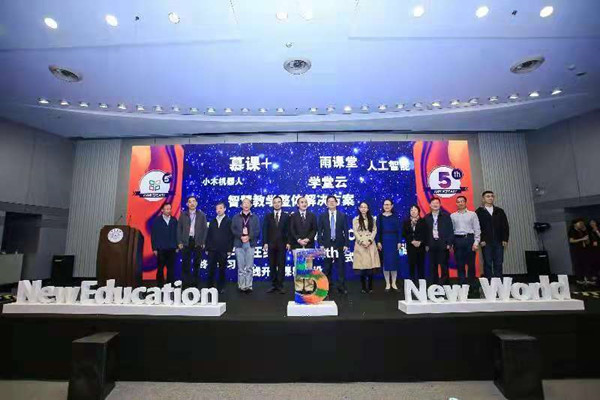
A forum marking the fifth anniversary of MOOC's entrance in China held at Tsinghua University, on Oct 10, 2018. (Photo: xuetangx.com)
The Massive Open Online Courses (MOOC), launched in China's prestigious Tsinghua University five years ago, has achieved sound momentum, providing more than 50 million lessons for over 70 million people by April, 2018.
On May 21, 2013, Tsinghua announced its accession to edX, the MOOC provider founded by Harvard University and the Massachusetts Institution of Technology, while on October 10, the Chinese University launched Asia's first MOOC learning platform named xuetangx.com.
Speaking at a forum marking the fifth anniversary of MOOC at Tsinghua on October 10,
Jiang Shengyao, deputy president of the university, said: "Five years on, MOOC has crossed over the barriers of conventional education confined to fixed times and venues, exploring and sharing high quality educational resources for learners at different ages and with different backgrounds. "
George Siemens, psychology professor at the University of Texas Arlington and one of the founders of MOOC, told the forum: "The teachers in control are not focused on the students. What we wanted was a model that was more of a network rather than sort of a vertical relationship."
He went on: "Students are the center of future learning and the students need to develop skills to continue to learn even if the teacher is gone. "
The term of MOOC was coined in 2008 when Siemens started a course called "Connectivism and Connective Knowledge" at Athabasca University. In 2011 Stanford University rolled out three MOOC courses with enrollment reaching about 160,000. About one year later, edX emerged and became a major MOOC provider.
"MOOC are not completely new by themselves, MOOC are part of a long history of universities, trying to serve society by improving the access that the individuals have to education," Professor Siemens stressed.
He also reiterated that learning is a coherent and lifelong process so that the educators should scrap mundane routines and overcome the fragmented supply of knowledge, particularly in the digital era, so as to have students learning with universities not just for four years, but maybe for 40 to 60 years.
While emphasizing MOOC's flexible and lifelong learning process, Long Fenjie, president of Guizhou Institute of Technology, said the online educational model was leveling the playing field for students coming from underprivileged regions.
"China's rural children have obstacles in learning English and making use of new technologies," Long said. "However, our Institute, established no more than six years ago and endeavoring to serve the province's industrialization drive to lift 40 million people out of poverty, has benefited greatly from the rapid development of MOOC."
The Institute has uploaded seven courses, such as "College Physics" and "the World of Materials," to enable students to learn by themselves.
Yuan Si, director at the Research Center of Online Education of the Ministry of Education, said online education was a workable strategy for China's future course.
With increasingly frequent exchanges between Chinese and overseas educational institutes, exemplified by the launch of "Introducing China in English" from xuetangx.com to the French MOOC platform known as "Le Fun," MOOC can always bring something unexpected to us time and again each year, he said.


